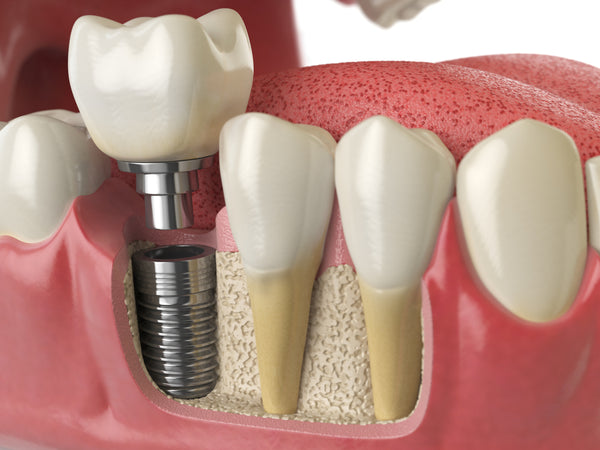
Dental Implants: Understanding the Procedure & Benefits
Dental implants are artificial tooth roots made of biocompatible materials such as titanium. They are strategically placed into the jawbone through a surgical procedure to provide a secure base for replacing missing teeth. Unlike traditional options like bridges or dentures, dental implants offer a permanent and natural-looking solution for missing teeth.
Impacts of Tooth Loss
Tooth loss is a common dental issue. It happens due to various factors, including periodontal disease, tooth decay, trauma, congenital conditions, and aging. Regardless of the cause, losing a tooth can significantly affect oral health, function, and aesthetics. It makes it hard to speak or chew and may lead to a loss of confidence and self-esteem.
When left untreated, tooth loss may also cause bone resorption, shifting of adjacent teeth, and changes in facial appearance over time.
Understanding the Dental Implant Procedure

The dental implant system features a dental implant abutment and dental implant body and may also have an abutment fixation screw. Here's a look at the dental implant placement process, its benefits, candidacy, and post-operative care.
Pre-operative Assessment
Before a dental implant surgery, you will first undergo a comprehensive pre-operative assessment. Your dentist will examine your oral health, including the condition of your teeth and gums. They may also take diagnostic imaging like X-rays or CT scans to evaluate the quality and quantity of your jawbone.
Surgical Placement
Your dentist will then issue a local anesthesia to ensure your comfort throughout the procedure. In the first stage, they will make a small incision in the gum tissue to expose the underlying jawbone, and use a special drill to create a small hole in the jawbone, into which the dental implant fixture is carefully inserted. This fixture serves as the artificial tooth root and is made of biocompatible materials. Your dentist may do a bone graft or sinus augmentation to develop the bone for the implant placement.
Healing and Osseointegration
Osseointegration is a natural healing process where the implant bonds with the surrounding bone tissue to provide a stable and durable foundation for the replacement tooth. It typically takes several months to complete, during which time you'll wear a temporary restoration to maintain aesthetics and function.
Abutment Placement
Following osseointegration, your dentist will then proceed to place the abutment, which is a small connector piece that attaches to the implant fixture and sticks out through the gum line. It serves as the anchor for the final restoration, such as dental crowns.
Final Restoration
Finally, your dentist will attach the permanent restoration to the abutment. This restoration is custom-designed to match your natural teeth' color, shape, and size, ensuring a seamless and natural-looking result. Whether you're replacing a single tooth or multiple teeth, the final restoration will be carefully crafted to blend seamlessly with your smile.

Post-operative Care
Proper post-operative care is essential for promoting healing and ensuring the long-term success of your permanent dental implants. Your dentist will tell you how to care for your implants, including oral hygiene practices, dietary restrictions, and any necessary follow-up appointments.
Long-term dental care practices include:
- Brush and floss regularly
- Attend regular dental Check-ups
- Avoid smoking and excessive alcohol consumption
- Protect your implants
- Maintain overall health
Benefits of Dental Implants
Let's explore some benefits of implant dentistry:
Enhanced Functionality
Dental implants help restore full chewing function. And the best part is they work like natural teeth, and don't feel bulky and or limit the ability to eat certain foods. With implants, you can confidently enjoy your favorite foods without worrying about slippage or discomfort.
Improved Aesthetics
The fact that they look natural means they do a great job providing a seamless and aesthetically pleasing smile. Dental implants are custom designed to blend smoothly with your existing teeth and restore your smile to its natural beauty.

Durable and Long-Lasting
Compared to braces and other tooth replacement options that may need to be replaced or adjusted periodically, implants are designed to be a permanent solution. This makes them a cost-effective investment in your long-term oral health.
Improved Oral Health
Dental implants don't require shaving down or altering adjacent teeth. Unlike dental bridges, they help preserve the integrity of your natural teeth. And the best part is they're easy to clean and maintain. This means you won't have a hard time preventing gum disease and tooth decay.
Restored Confidence and Self-Esteem
Healthy teeth and a beautiful smile profoundly impact your confidence and self-esteem. When your teeth are in good condition, and your smile is bright, you feel more comfortable and self-assured in social and professional situations. A confident smile allows you to express yourself freely and engage with others without hesitation, ultimately enhancing your overall quality of life.
Common Concerns and Misconceptions About Dental Implants
Despite the numerous benefits of dental implants, there are common concerns and misconceptions that patients may have.
Pain and Discomfort
One of the patients' most common concerns about dental implants is the fear of pain during the procedure and discomfort afterward. But as mentioned earlier, the procedure happens under local anesthesia to minimize discomfort. Dentists also prescribe pain medications to help with any discomfort after the procedure.
Dental Implants are Risky
Some patients may worry that dental implant surgery is risky or prone to complications. In reality, dental implant placement is a routine and highly successful procedure with a success rate of over 90 to 95%. Besides, dentists do a thorough analysis before dental implant procedure and will guide you through every step of the process to minimize any potential risks.
Cost of Treatment
Cost is often a concern for patients considering dental implants. While it's true that dental implants may require a higher initial investment compared to dentures or bridges, the long-term benefits and cost-effectiveness of implants are greater. With proper care, dental implants can last a lifetime. This makes them a worthwhile investment in oral health and quality of life.
Dental Implants Require Extensive Maintenance
Some patients may worry that dental implants require complicated or time-consuming maintenance. In reality, caring for dental implants is quite simple and similar to caring for natural teeth. Regular brushing, flossing, and dental check-ups are essential for maintaining the health of your implants and surrounding tissues.
Find Dental Implants Equipment At Dental Finds
Dental implants do a great job helping restore the smile and improve oral health and overall wellbeing. However, the success of the procedures greatly depends on having the right tools and equipment. At Dental Finds, we provide dentists with high-quality, reliable equipment needed to ensure successful implant surgeries. Explore our comprehensive range of dental implant equipment today and elevate your implant practice to new heights.

